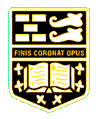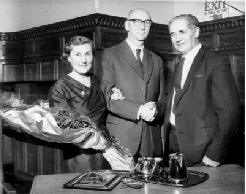|
TRIBUTES TO MR. R. F. WHEATLEY
MANY MEMBERS of the William Baker School can write more adequately than I am able to do in regard to the twenty-two years of service which
Mr. Wheatley gave to the School as its Headmaster. Some lived in the School as he did and so were in closer contact with him than I ever could be,
yet I respond with much pleasure to the Editor's invitation to pay some tribute to his qualities as a Headmaster. I shall leave others to deal with the
educational side of his work and myself deal with a more personal aspect.
My contact with the School began at the end of 1942 when it was, like many organisms, suffering from the stresses and strains of the war. I was
alarmed by the structural condition of the buildings: by gross over-crowding and under-staffing and the inadequate employment in terms of practical
training of new entrants to the School, a consequence of the defects mentioned. I made tentative suggestions to the Barnardo Council for
improvements and when in 1945 the position of Headmaster became vacant, the Council offered the appointment to Mr. Wheatley.
Before accepting it he had paid two visits to the School and it needed a man of character and courage to accept the post. The task of re-organization
was a formidable one, even on the structural side alone. For example the sanitary conditions were almost primitive and the kitchens were unhygenic.
But one could not make a clean sweep of the defects. Permits for such work were not readily available and materials were in short supply. There
was also the urgent need to reduce over-crowding and improve the technical training.
Mr. Wheatley faced these challenges with courage and vision. What impressed me most in those early days—and indeed continued to do so
throughout his career—was not primarily his academic competence for the tasks ahead, but his humanity. 1 can illustrate this in regard to the over
crowding. This existed in the dormitories and in the inadequacy of recreational facilities. These deficiencies tended to make the life of the boys
aimless and depressing. Mr. Wheatley saw one way of giving some immediate relief to this situation, but this was only possible by making a
personal sacrifice of his own comfort and convenience. He saw that if he gave up a large bedroom and the large lounge hall in his residential
quarters, some small but vital amelioration of the boys' discomfort would be effected, so this was done.
The contributions which Headmasters' wives make to the welfare of a school are often overlooked, but this sacrifice of space, of privacy, of
quietness could not have been made without the full co-operation of Mrs. Wheatley, who in exchange was given noise, dust and dirt as she shared
part of her home with the boys.
Space does not allow me to develop this theme, but I regularly visited the School, staying for odd nights and week-ends when the Headmaster
discussed his ideas and plans for change and development. The various proposals which he put forward were based upon his wide experience and
knowledge, but the true basis of it all was Christian humanity. For this all boys must remain permanently in his debt.
THEODORE. F. TUCKER
Goldings was opened in November, 1922, as a school for the purpose of training young men in specific trades, and as we all know will cease to
function at the end of July 1967, a total period of 45 years. Mr. Wheatley took over as Headmaster in April 1945, and when he retired could claim
to have steered the course for approximately half of our school's life.
His appointment was instigated at the recognition of the School by the Ministry of Education and as one would expect a new era was born. That
changes should take place were obvious and important, and it is only when one looks back and analyzes the past twenty-two years that it is possible
to assess the character of the man who undertook this monumental task. Mr. Wheatley would be the first to admit that little would have been
accomplished without the support and loyalty of dedicated members of staff and working perhaps closer to him than most, over past years, trying
to share a little of the load, I was specially privileged to form an opinion of his character.
The early years, almost akin to mediaeval compared to present-day standards, meant resisting pressure from idealists on the one hand, stagnated
reactionists on the other, together with war-time restrictions which still existed at the time, instituting a workable, realistic programme was fraught
with obvious frustration.
Thoughtful planning was followed by action, based on improvements to training methods and curriculum and increasing and modernising buildings
and facilities. Two additional training departments were introduced, i.e. "Gardening, and Painting and Decorating, primarily to widen the scope and
choice of the large intake of boys and also to absorb more boys into active training. The School strength in 1945 was 268 boys aged from 15 to
17/18 years and at least sixty to seventy of these were categorized as 'spares', who wandered idly around the establishment daily, trying hard to
keep out of trouble. This was an intolerable situation and one which Mr. Wheatley wasted little time in putting right.
A long-term building programme was approved which gradually became effective, perhaps not without extreme pressure, both to the mansion and
departmental offices. A new ablution block, alteration to dormitories, with spacious sitting rooms, indoor toilets and bathroom facilities,
Improvements to resident staff quarters, building of the MacAndrew Wing, modernizing of the boys' dining hall and main kitchen were all
monuments of the 'New Goldings'. A new prefabricated building, intended originally for Boot and Shoe training, although most unsuited to the
purpose, was taken over as a General Subjects department, consistent with a complete revisal of policy, where the recruitment age was lowered to
13 years. It took another decade at least for Mr. Wheatley to convince the 'powers that be', the necessity for a properly equipped range of
classrooms, and in September 1965, the now new School block was officially opened by Sir John Hunt. Extentions and essential alterations were
made to Printing, Painting and Decorating, Gardening and Carpentry Departments to increase the potential of each unit.
We saw the printer apprentice scheme introduced, linked with the purchasing of the Verney as a hostel and a close liaison established with the
Building Trades Apprenticeship Committee who supported and gave valuable assistance in the placing of boys in secure employment.
In twenty-two years some 1,200 boys passed through the School, all at some time or another needing personal guidance and advice. In the early
years the boys were almost all orphans but this gradually changed, when towards the end they invariably came from broken homes. The emotionally
disturbed boy brought a new kind of problem, particularly when he wasn't completely severed from the unstable environment of his home, returning
perhaps three times a year for school holidays. Mr. Wheatley found that not only had he to readjust his own approach to the changing nature of daily
problems, it became necessary also to impress this upon his staff who themselves were directly concerned with the welfare of the boys.
The foregoing reminiscing outlines to some extent the character of a man who by his patience, amiable manner, judgement and complete
unselfishness, steered and guided boys, and often staff through, oft-times, a twenty-four hour day, whether it was connected with pleasurable
pursuit or tantrums and crisis.
To stand up to the stresses and strains, trials and tribulations of the every day life of a residential school like Goldings, sound academic qualifications
are paramount, plus unlimited experience and a sympathetic outlook, founded upon Christian principles, not to mention a 'cast iron constitution'. It
would not be presumptions to state that Mr. Wheatley's career was sparked off when he gained a Distinction in Maths at School Certificate level,
following this with further Distinction in Maths and Chemistry in the Higher School Certificate and a University Entrance Scholarship. Graduating
eventually at Birmingham University with a Bachelor of Science degree and later obtaining a Diploma in Education and Board of Education
Certificate he then commenced his teaching career.
To outline the full breadth of post graduate courses covered over the intervening years would be beyond the scope of an appreciation such as this,
yet one can easily define the obvious evidence, why Mr. Wheatley was so admirably fitted for such a post as headmaster of Goldings. Woodwork,
Physical Training, Bookcraft, Gardening, History, Music, Science, Youth Leaders Course, Education of the backward Child, and Religious
Knowledge were ably supported by service as Chairman of a local Youth Service Council, O.C. of Army Cadet Force Company and as an active
member of Drama Groups.
Still not satisfied with his own accomplishments, he entered upon a course of part-time study at the London University and gained a further
Diploma in Social Studies, while at Goldings.
Mr. Wheatley had the distinction of gaining his first headship, at the early age of twenty-seven, at Byfield County School, following this with a
similar responsibility at Oundle Senior Mixed School and just prior to moving to Goldings was Lecturer in Engineering and Building Departments
at Burton-on-Trent Technical School. This invaluable experience which he was able to exert to full capacity at Goldings was further supported by
unbroken service in the teaching profession as an assistant master, first at Bierton Road Senior Mixed
School and then at Bierton Senior Boys School in Birmingham.
Retirement, like old age, is inevitable for us all and although I am sure Mr. Wheatley will find more
than enough to occupy his new-found 'freedom', at least he will have time to concentrate upon his
own life and enjoy peace and contentment with his family.
As I pen these notes, nostalgically occupying the study which was his private domain for so many
years, I know that all the staff here and 1,200 boys, where ever they may be, will want to be
associated and remembered by Mr. and Mrs. Wheatley and join me in extending to them a long
and happy retirement.
L. EMBLETON
|




